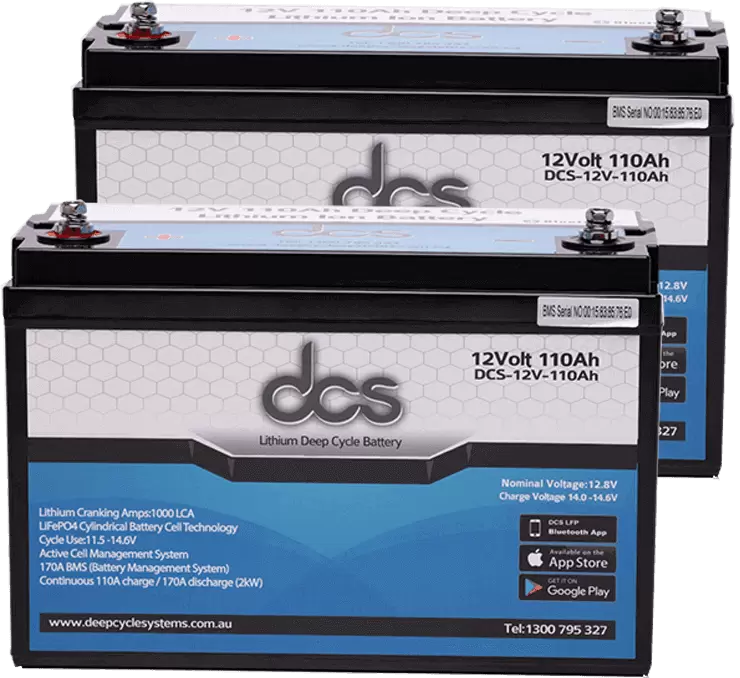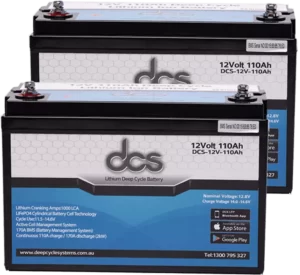Solar charging batteries have revolutionized the way you harness and store energy. As the world becomes increasingly aware of the need for sustainable and renewable energy sources, solar power has emerged as a viable and efficient solution. Solar Charging Battery plays a crucial role in that process, allowing you to capture and store the energy from sunlight for use during times of high demand or when the sun is not shining.
How Does A Solar Storage Battery Work?
A Solar Storage Battery or a solar battery system, is a device that stores energy generated from solar panels for later use. It acts as a reservoir, capturing the surplus energy produced during the day and supplying it during the night or when the demand exceeds the solar panel’s capacity.
The process begins with solar panels converting sunlight into direct current (DC) electricity. That DC electricity is then fed into an inverter, which converts it into alternating current (AC) electricity that can be used to power appliances and devices directly. However, when the energy generated exceeds the immediate demand, the excess is sent to the solar-charging battery for storage.
The battery stores the energy in the form of chemical potential energy, using a chemical reaction within its cells. When the stored energy is needed, the battery converts the chemical potential energy back into electrical energy, which can be used to power homes, businesses, or even electric vehicles. That seamless flow of energy ensures a continuous and reliable power supply, even when the sun is not shining or during peak demand periods.
Advantages Of Using A Solar System Battery
The use of solar charging batteries offers numerous advantages that contribute to the growing popularity of solar power systems. Firstly, Solar System Battery provides energy independence. By storing excess energy generated during the day, homeowners and businesses can rely less on the grid and reduce their dependence on fossil fuel-based electricity. That not only helps reduce utility bills but also provides a backup power source during blackouts or emergencies.
Secondly, solar storage batteries promote environmental sustainability. Solar power is a clean and renewable energy source, and when combined with energy storage, it becomes even more sustainable. By using solar charging batteries, you can reduce your carbon footprint, decrease greenhouse gas emissions, and contribute to a greener and healthier planet.
Thirdly, solar system batteries offer financial benefits. With the growing affordability of solar panels and battery technology, investing in a solar power system with a battery can result in long-term savings. By storing excess energy and using it during peak demand periods, users can take advantage of lower electricity rates and potentially even sell surplus energy back to the grid.
Different Types Of Solar Charging Batteries
Solar charging batteries come in various types, each with its own set of characteristics and suitability for different applications. The most common types of solar batteries include lead-acid batteries, lithium-ion batteries, and saltwater batteries.
Lead-acid batteries have been around for decades and are widely used in solar power systems. They are cost-effective but have a shorter lifespan compared to other types. Lithium-ion batteries, on the other hand, are becoming increasingly popular due to their higher energy density, longer lifespan, and faster charging capabilities. They are lightweight, compact, and require less maintenance.
Saltwater batteries are a newer technology that uses a saline solution as an electrolyte. They are non-toxic, have a long lifespan, and are considered more environmentally friendly. When choosing a solar-charging battery, it is important to consider factors such as capacity, efficiency, lifespan, cost, and compatibility with the solar power system. Consulting with a solar energy professional can help determine the most suitable battery type based on individual needs and requirements.
Understanding Solar Storage Batteries
To understand the science behind solar charging batteries, it is important to grasp the concept of energy storage and conversion. Solar storage batteries utilize a chemical reaction to store and release electrical energy. Within the battery, there are two electrodes – a positive electrode (cathode) and a negative electrode (anode). These electrodes are immersed in an electrolyte solution.
During charging, when the excess solar energy is sent to the battery, a chemical reaction occurs. The positive electrode releases positively charged ions, while the negative electrode absorbs these ions. That process stores electrical energy in the battery. When the stored energy is needed, the chemical reaction is reversed, and the positive ions move back to the positive electrode, releasing electrical energy in the process.
That complex interplay of chemical reactions allows solar charging batteries to efficiently store and release energy, providing a reliable and continuous power supply.
Exploring The Science Behind A Solar Battery System
Solar charging batteries rely on the principles of electrochemistry to store and release energy. The chemical reactions that occur within the battery are facilitated by the movement of ions between the positive and negative electrodes. That movement of ions is driven by a difference in electric potential between the two electrodes. During charging, the solar panels convert sunlight into electricity, creating a surplus of electrons on the negative electrode.
The difference in electric potential between the two electrodes creates an electric field, which drives the movement of ions. As the battery charges, positively charged ions from the electrolyte solution move towards the negative electrode, where they are absorbed. At the same time, negatively charged ions move towards the positive electrode. That movement of ions allows the battery to store electrical energy. When the stored energy is needed, the chemical reaction is reversed.
The positive ions move back towards the positive electrode, releasing the stored electrical energy in the process. That flow of electrons creates an electric current that can be used to power devices and appliances. Understanding the science behind a solar battery system helps you appreciate the intricate processes involved and the technological advancements that have made solar charging batteries a reliable and efficient energy storage solution.
Factors To Consider When Choosing A Solar-Powered Charging Battery
Choosing the right solar-charging battery is crucial to ensure optimal performance and longevity of the solar power system. Several factors should be taken into consideration when making that decision.
- Firstly, the capacity of the battery is an essential consideration. It determines how much energy can be stored and used during periods of high demand or when the sun is not shining. Assessing the energy needs and usage patterns is crucial in determining the appropriate battery capacity.
- Secondly, the efficiency of the battery is important. Losses during the storage and conversion process can significantly impact the overall performance of the system. Higher efficiency batteries ensure minimal energy loss and maximize the utilization of the stored energy.
- Lifespan is another critical factor. Solar charging batteries have a limited lifespan, typically measured in cycles. Each cycle represents one full charge and discharge of the battery. It is important to choose a battery with a lifespan that aligns with your long-term energy needs.
- Cost is often a deciding factor when choosing a solar-charging battery. While lithium-ion batteries are generally more expensive upfront, they offer longer lifespans and higher efficiency, resulting in better long-term value for money.
- Compatibility with the solar power system is also important. Different battery types and brands may have specific requirements and compatibility considerations. Consulting with a solar energy professional can help ensure the battery chosen is compatible with the existing solar power system.
Tips For Maximizing The Efficiency Of Your Solar Battery
To maximize the efficiency of your solar-charging battery and optimize its performance, consider the following tips:
Regular Maintenance: Ensure regular maintenance of the battery, including cleaning the terminals and checking for any signs of wear or damage.
Optimal Charging: Follow the manufacturer’s guidelines for charging the battery. Overcharging or undercharging can reduce its efficiency and lifespan.
Avoid Extreme Temperatures: Extreme temperatures can affect the performance of the battery. Install the battery in a location that is not exposed to excessive heat or cold.
Monitor Energy Usage: Keep track of your energy usage patterns and adjust accordingly. By aligning your energy usage with periods of high solar production, you can maximize the utilization of the stored energy.
Consider Energy Management Systems: Energy management systems can help optimize the usage of solar energy and efficiently manage the charging and discharging of the battery.
By implementing these tips, you can ensure that your solar-charging battery operates at its full potential, providing you with reliable and sustainable energy.
Common Misconceptions About Solar Charging Batteries
Despite the increasing popularity of solar charging batteries, there are still some misconceptions surrounding their use and effectiveness. Let’s address a few common misconceptions:
Solar batteries are only for off-grid systems: While solar batteries are commonly used in off-grid systems, they are equally beneficial in grid-tied systems. They can provide backup power during blackouts or supplement the grid’s electricity during peak demand periods.
Solar batteries are too expensive: While the upfront cost of solar batteries may seem high, the long-term savings and financial benefits outweigh the initial investment. Additionally, advancements in technology have led to a decrease in battery costs over time.
Solar batteries require a lot of maintenance: Modern solar charging batteries, especially lithium-ion batteries, require minimal maintenance. They are designed to be low-maintenance and user-friendly.
Solar batteries are not environmentally friendly: On the contrary, solar charging batteries contribute to a greener and more sustainable future. By reducing reliance on fossil fuel-based electricity, solar batteries help reduce carbon emissions and promote clean energy usage.
It is important to dispel these misconceptions and spread awareness about the benefits and effectiveness of solar charging batteries in order to encourage their wider adoption.
FAQs
Q: Can I install a solar charging battery in my existing solar power system?
A: In most cases, yes. However, it is recommended to consult with a solar energy professional to ensure compatibility and optimal performance.
Q: How long do solar charging batteries last?
A: The lifespan of solar charging batteries varies depending on factors such as battery type, usage patterns, and maintenance. Generally, lithium-ion batteries have a longer lifespan compared to lead-acid batteries.
Q: Can solar charging batteries power my entire home?
A: The capacity of the battery and the energy needs of the home determine whether a solar charging battery can power the entire home. Consulting with a solar energy professional can help assess the requirements and determine the appropriate battery capacity.
Q: How much can I save by using a solar charging battery?
A: The savings vary depending on factors such as electricity rates, energy consumption, and the size of the solar power system. However, by storing excess energy and using it during peak demand periods, users can take advantage of lower electricity rates and potentially save on their utility bills.
Conclusion
Solar charging batteries have revolutionized the way you harness and store energy. By converting sunlight into stored energy, they provide a reliable and sustainable power source for homes, businesses, and even electric vehicles. Understanding the science behind solar charging batteries helps you appreciate their efficiency and the role they play in the transition to clean and renewable energy sources. By considering factors such as capacity, efficiency, lifespan, and cost, individuals can choose the most suitable battery for their solar power system.


